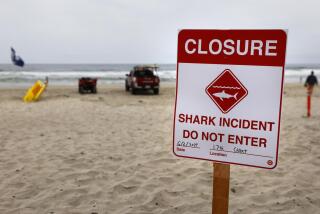Shark survivors lobby on behalf of their attackers
WASHINGTON — Chuck Anderson is in Washington today to save the thing that bit off his arm.
It happened in June 2000, when he was swimming in the Gulf of Mexico off Alabama. A 7-foot bull shark came up from below, knocking him out of the water. It snapped off four of Anderson’s fingers, chomped at his belly, then ripped away his right arm below the elbow.
The attack almost killed Anderson, now 54. It also turned him into an advocate for one of the most fearsome fish in the sea.
“They’re vicious and they’re mean,” Anderson said. “But you know, I don’t have any right to be angry at the shark.”
Anderson is in town for what could be the largest gathering of American shark-attack survivors to date -- and certainly one of the oddest lobbying blitzes ever on Capitol Hill. At least nine survivors plan to press the Senate to put new restrictions on fishing for sharks, some species of which are in deep decline. Thirty-two percent of the sharks and rays that live in the open ocean were classified as threatened this year by the International Union for the Conservation of Nature. Scientists fear that ocean ecosystems could be knocked out of whack by the loss of their “apex” predators.
The nine shark survivors offer a wildly counterintuitive story. For them, the terrifying seconds they spent as prey have created a forgiving, even admiring, bond with the ocean’s predators.
The group was organized by a survivor who works for the nonprofit Pew Environment Group, who began calling others to see whether they might want to offer their unique perspective and lobby for protections. Some balked, but several signed on, and Pew agreed to fund their outreach.
“We’ll finally be heard,” said Al Brenneka, 52, who lost his right arm to a 7-foot lemon shark in 1976. “Who should speak up for the sharks better than the people that the sharks have spoken to themselves?”
Shark bites are rare in the United States: Since 2000, there have been an average of 43 per year, only a handful of them fatal.
At last count, the Florida-based International Shark Attack File calculated the odds of an attack as 1 in every 11.5 million beach visits.
At the same time, sharks have been devastated by humans. The trade in fins for shark fin soup, a delicacy in Asia, has been blamed for heavy fishing of many species. Others are slaughtered for the rest of their meat, or killed accidentally by fishermen setting out nets or hooks for tuna and marlin.
The attack survivors are in Washington to lobby for a Senate bill that would outlaw shark “finning” -- a practice where fishermen slice off a shark’s fin and toss the rest of its carcass overboard -- in U.S. waters. The bill has passed the House and has the support of federal fisheries managers, who say it would make existing shark protections easier to enforce.
It won’t save the world’s shark populations: Scientists say finning is largely done by overseas fishing crews. In the United States, it is already outlawed in the Atlantic Ocean and the Gulf of Mexico and has been largely curtailed in the Pacific.
Debbie Salamone was walking in waist-deep water at Cape Canaveral National Seashore when a shark seized her heel, severing the Achilles’ tendon. She had been a committed environmentalist before the attack, but afterward, “if they proposed to pave over half the ocean for a strip mall and a parking lot, I would have been fine with it,” she said.
But now she works full time at the Pew group and says she came to see the attack as a deep, gory test of her resolve to help the environment. Including -- maybe especially -- the parts of it that bite.
More to Read
Sign up for Essential California
The most important California stories and recommendations in your inbox every morning.
You may occasionally receive promotional content from the Los Angeles Times.










